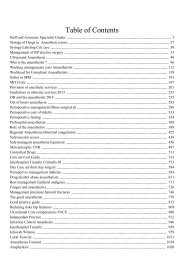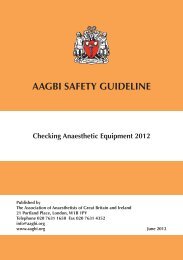pdfjoiner
You also want an ePaper? Increase the reach of your titles
YUMPU automatically turns print PDFs into web optimized ePapers that Google loves.
Barker et al. | Guidelines on peri-operative management of diabetes Anaesthesia 2015<br />
that elective surgery should be delayed if it is<br />
≥ 69 mmol.mol<br />
1 , while control is improved. Changes<br />
to diabetes management can be made concurrently with<br />
referral to ensure the patient’s diabetes is as well controlled<br />
as possible at the time of surgery. Elective surgery<br />
in patients with diabetes should be planned with the aim<br />
of minimising disruption to their self-management.<br />
•<br />
Recommendation: Glycaemic control should be<br />
checked at the time of referral for surgery. Information<br />
about duration, type of diabetes, current<br />
treatment and complications should be made available<br />
to the secondary care team.<br />
Surgical outpatient clinic<br />
The adequacy of diabetes control should be assessed<br />
again at the time of listing for surgery, ideally with a<br />
recorded HbA1c < 69 mmol.mol<br />
1 in the previous three<br />
months. If it is ≥ 69 mmol.mol<br />
1 , elective surgery should<br />
be delayed while control is improved. In a small number<br />
of cases it may not be possible to improve diabetic control<br />
pre-operatively, particularly if the reason for surgery,<br />
such as chronic infection, is contributing to poor control,<br />
or if surgery is semi-urgent. In these circumstances, it<br />
may be acceptable to proceed with surgery after explanation<br />
to the patient of the increased risks. Patients should<br />
be managed as a day case if the procedure is suitable<br />
and the patient fulfils the criteria for day-case surgery<br />
management. Well-controlled diabetes should not be a<br />
contra-indication to day-case surgery.<br />
Patients with poorly controlled diabetes at the time<br />
of surgery will need close monitoring and may need to<br />
start a variable-rate intravenous insulin infusion (VRIII).<br />
• Recommendation: Patients with diabetes should be<br />
identified early in the pre-operative pathway.<br />
Pre-operative assessment<br />
Appropriate and early pre-operative assessment should<br />
be arranged. A pre-operative assessment nurse may<br />
undertake the assessment with support from either an<br />
anaesthetist or a diabetes specialist nurse. It should<br />
occur sufficiently in advance of the planned surgery to<br />
ensure optimisation of glycaemic control before the<br />
date of proposed surgery. The aim is to ensure that all<br />
relevant investigations are available and checked in<br />
advance of the planned surgery, that the patient understands<br />
how to manage his/her diabetes in the peri-operative<br />
period, and that the period of pre-operative<br />
fasting is minimised.<br />
• Recommendation: Tests should be ordered to assess<br />
co-morbidities in line with National Institute for<br />
Health and Care Excellence (NICE) guidance on<br />
pre-operative testing [22]. This should include urea<br />
and electrolytes and ECG for all patients with diabetes;<br />
however, a random blood glucose measurement<br />
is not indicated.<br />
Planning admission (including day surgery)<br />
The aim is to minimise the fasting period, ensure<br />
normoglycaemia (capillary blood glucose (CBG) 6–<br />
10 mmol.l<br />
1 ) and minimise as far as possible disruption<br />
to the patient’s usual routine. Ideally, the patient<br />
should be booked first on the operating list to minimise<br />
the period of fasting. If the fasting period is<br />
expected to be limited to one missed meal, the patient<br />
can be managed by modification of his/her usual diabetes<br />
medication (see below). Patients should be provided<br />
with written instructions from the pre-operative<br />
assessment team about management of their diabetes<br />
medication on the day of surgery, the management of<br />
hypo- or hyperglycaemia in the peri-operative period,<br />
and the likely effects of surgery on their diabetes control.<br />
Patients should be advised to carry a form of glucose<br />
that they can take in case of symptoms of<br />
hypoglycaemia that will not cause surgery to be cancelled,<br />
for example a clear, sugar-containing drink<br />
(glucose tablets may be used instead, but some anaesthetists<br />
may feel they should not be taken within 6 h<br />
of the start of anaesthesia). Patients should be warned<br />
that their blood glucose control may be erratic for a<br />
few days after the procedure.<br />
• Recommendation: When possible, admission should<br />
be planned for the day of surgery, with both the<br />
patient and the ward staff aware of the planned<br />
peri-operative diabetes care, including a plan to<br />
manage hypo- and hyperglycaemia. Surgery should<br />
be scheduled at the start of the theatre list to<br />
minimise disruption to the patient’s glycaemic<br />
control.<br />
© 2015 The Authors. Anaesthesia published by John Wiley & Sons Ltd on behalf of Association of Anaesthetists of Great Britain and Ireland 3





